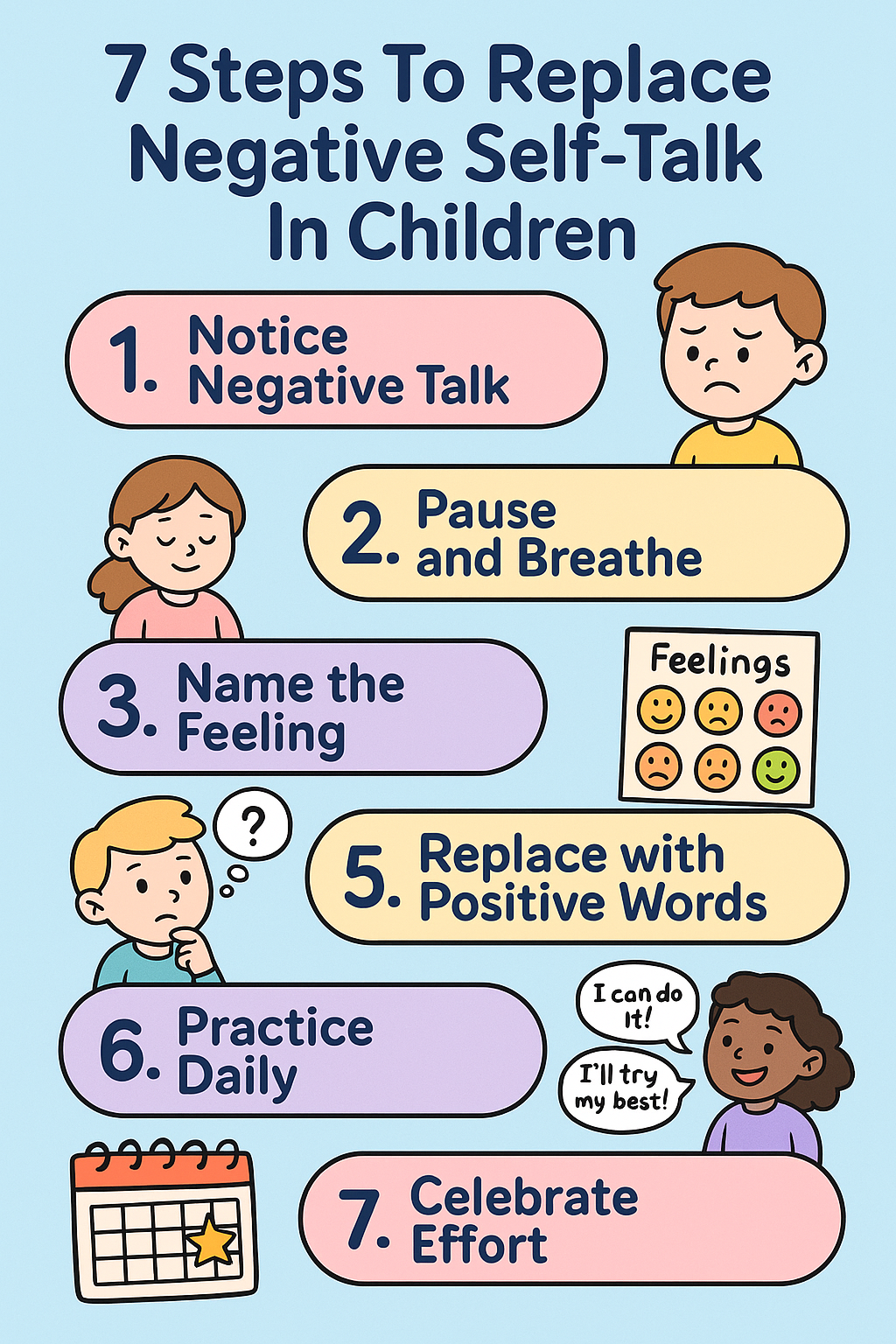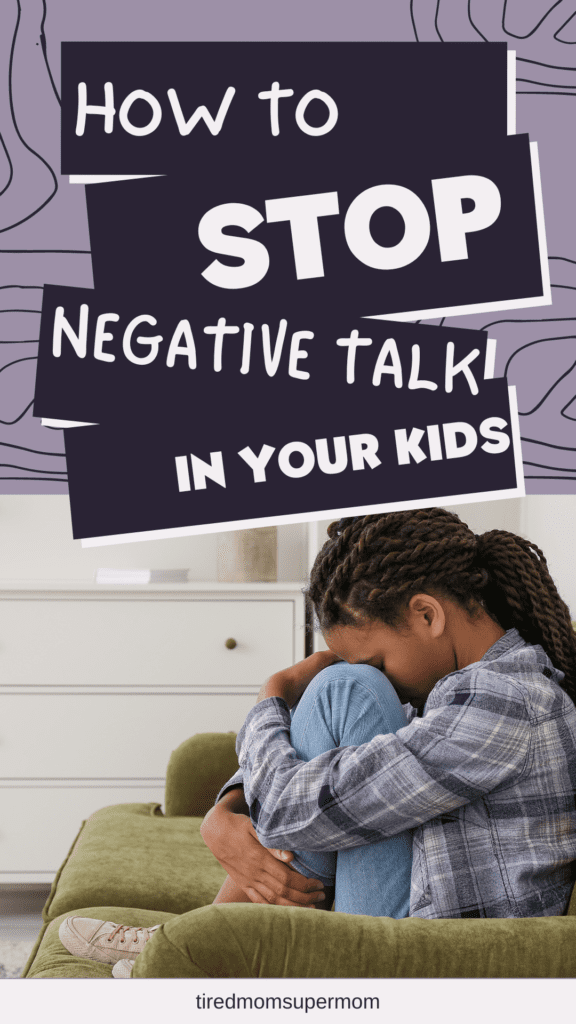How To Stop Negative Self Talk In Children: 7 Parenting Strategies That Work
As a parent, hearing your child use negative self-talk can be heartbreaking – which is why it’s important to know how to stop negative self talk in children!
It’s a common response to challenging situations, but it’s important to help your child develop positive self-talk to replace those negative thoughts.
When my middle child kept saying ‘I’m dumb’ after struggling with math, I realized we needed to change how we spoke about mistakes at home. This I Can’t Do It Mindset is common for kids of all ages.
This blog post aims to provide effective strategies to foster a growth mindset, improve emotional intelligence, and support your child in difficult times.
Heads up: This post may include affiliate links. As an Amazon Associate, I earn from qualifying purchases—at no extra cost to you. Full privacy policy and disclosure here.
Understanding Negative Self-Talk In Children
Negative self-talk often stems from a fixed mindset, where children believe their abilities are static and unchangeable.
Learning how to stop negative self talk in children starts with recognizing the language they use every day.
This can lead to low self-esteem, negative thoughts, and an unhealthy pattern of self-critical behavior.
For instance, after a bad day at school or struggling with a math problem, a child might say, “I’m just not good at math,” reinforcing a fixed mindset.
Encouraging a Growth Mindset
The most important thing you can do is to encourage a growth mindset. Emphasize that abilities and intelligence can grow with effort and hard work.
When your child encounters a math problem or any difficult situation, remind them that it’s an opportunity to learn and improve.
For a deeper understanding of fostering a growth mindset, I highly recommend Carol S. Dweck’s Mindset: The New Psychology of Success. This book provides valuable insights into how beliefs about our abilities can shape our success.
Explore additional resources on fostering a growth mindset
To further support your child’s emotional development, consider reading The Gifts of Imperfection by Brené Brown. It offers practical advice on building resilience and self-worth.”

How To Stop Negative Self Talk In Children: Practical Strategies
- Model Positive Self-Talk: Children learn by example. Use positive affirmations in your daily life. When you make mistakes, model positive thinking by saying things like, “I can learn from this.
- Positive Statements and Affirmations: Help your child create a list of positive affirmations to counter negative thoughts. Phrases like, “I am capable,” and “I can handle this,” can be powerful.
- Reframe Negative Statements: Teach your child to reframe negative comments into positive statements. Instead of saying, “I can’t do this,” they can try, “I can’t do this yet, but I’m learning.
- Acknowledge and Validate Feelings: It’s crucial to experience empathy towards your child’s feelings. Acknowledge their big feelings and help them see their emotions in a different light. These tips are designed for parents who want to know exactly how to stop negative self talk in children with real-life strategies.
- Focus on Effort and Process: Praise your child for their hard work and effort, not just the end result. This reinforces the idea that perseverance leads to improvement.
- Use Positive Feedback: Offer positive feedback regularly to build your child’s self-worth. Highlight their strengths and remind them of past successes.
- Create an Environment of Support: Foster an environment where positive thinking is encouraged. Surround your child with positive influences and limit exposure to negative ones.
For additional strategies on nurturing your child’s development, The Whole-Brain Child by Daniel J. Siegel and Tina Payne Bryson is an excellent resource. It provides techniques for understanding and supporting your child’s emotional and cognitive growth
If you want to dive deeper into how mindset affects self-talk, you’ll love this guide on fixed vs. growth mindset for kids.

Dealing with Challenging Situations
When your child is having a hard time, such as struggling with math homework or feeling defeated after a saturday soccer game, it’s a good way to introduce coping skills.
Teach them to break down difficult tasks into smaller, manageable steps. Encourage them to take breaks and approach the problem with a fresh perspective.
When you hear your child say something harsh, pause and use this script to guide them gently toward a better mindset. It’s a helpful step in teaching them how to stop negative self talk in children.
Professional Help and Support
If negative self-talk becomes a persistent issue, it may be beneficial to seek professional help.
A clinical psychologist, like Rachel Busman, can provide strategies tailored to your child’s needs. Professional help is particularly important if the negative self-talk leads to significant distress or interferes with daily life.

Long-Term Benefits
Helping your child develop positive self-talk and a growth mindset will have a lasting positive impact on their life.
They’ll be better equipped to handle difficult situations, have a more optimistic mindset, and build resilience against negative thoughts.

FAQ
Why does my child use negative self-talk?
Children often use negative self-talk when they feel overwhelmed, discouraged, or fear failure. It’s a normal but important emotional signal. Understanding why children say negative things is the first step in learning how to stop negative self talk in children.
How can I teach my child to stop saying negative things about themselves?
You can model positive thinking, teach them to reframe negative thoughts, and use positive affirmations daily.
What phrases can help my child develop positive self-talk?
Try affirmations like “I can try again,” “Mistakes help me learn,” and “I am strong and capable.”
When should I seek professional help for my child’s negative self-talk?
If negative self-talk is persistent, impacts daily functioning, or worsens emotional health, a child psychologist can offer support.
Are there books that can help parents with this?
Yes! “Mindset” by Carol Dweck and “The Whole-Brain Child” by Daniel Siegel are excellent resources.
How To Stop Negative Self Talk In Children: Practical Strategies That Work
Incorporating these strategies into your daily interactions with your child can promote a positive change in their self-perception.
Remember, the best way to help your child is to model positive behavior yourself.
Encourage them, celebrate their efforts, and help them see the good things in their everyday life.
With consistency and love, you’ll see big changes in your child’s confidence — all by learning how to stop negative self talk in children.
This approach will not only improve their inner voice but also foster a healthier frame of mind for years to come.

